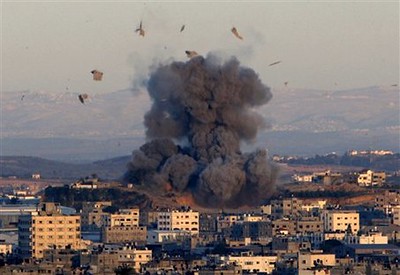Spotlight on the Israel-Hamas War: Economic Effects
Madeline Kruszczynski
Staff Writer
Just two days after the Palestinian terrorist group, Hamas, attacked Nova music festival in Israel, the International Monetary Fund (IMF) and the World Bank convened in their annual meeting in Marrakesh, Morocco. This meeting aimed to discuss the creation of resources to boost the slowing international economic growth but was confronted by the looming economic impacts of the Israel-Gaza conflict.
The escalating death toll within the region has tragically exceeded 4,000 fatalities with no indications of violence cessation, reports United Nations Office for the Coordination of Humanitarian Affairs. Such an extensive and severe conflict inherently carries significant ramifications, not only in humanitarian response but also in an economic outlook in the broader international community. At the IMF and World Bank conference, the assembly neglected to publicly comment on the economic impacts that are to follow as result of the violence. Instead, in a later published statement, IMF commented, “The IMF deeply mourns the tragic loss of life of so many civilians in Israel and Gaza. To those who have lost loved ones, to colleagues and partners in the region, and those worried about family and friends, you are in our thoughts. We hope that peace and stability prevail.” However, throughout the conference, private conversations took place that revolved around trade impacts, the looming involvement of other countries in the conflict, and other fears surrounding the conflict according to finance group participants as reported by Reuters.
In the wake of the bouts of inflation induced by the invasion of Ukraine last year, and the COVID-19 pandemic that disrupted global supply chains, the global economy is vulnerable. However, according to Al Jazeera, it is pertinent to note that the Israel and Palestine conflict is unlikely to exert a significant influence on the global economy, due to the limited production of oil in the region of conflict. Nevertheless, baring the oil rich regions surrounding the conflict site, namely Iran and Saudi Arabia, concern for global economic impact remains a plausible consideration when examining the economic impact the conflict will have.
On October 18, state-organized protests in support of Palestine took place across Iran, demonstrating the potential for Iran to assume a greater role in the ongoing conflict as reported by Reuters. According to The Guardian, the likelihood of Iran assuming an active role appears to be low, however, if Iran were to become involved, it would carry substantial implications for both the economy and oil prices.
Iran possesses control over the Strait of Hormuz, which is a critical passageway for the global oil trade, serving as a chokehold between the Arabian Gulf and the Gulf of Oman. According to the NASDAQ, the strait facilitates nearly 17 million barrels of oil daily. In the event that Iran’s presence in the conflict were to expand, economists predict a sharp rise in crude oil prices. If there were a closure in the Strait of Hormuz, oil prices could soar to an estimated $150 per barrel, further reports share.
Iran’s decision to expand its involvement in the violence hinges on the actions and decisions of Hassan Nasrallah, the Secretary General of the Iranian-backed political party and militant group, Hezbollah. Established in 1985, Hezbollah, which translates to “party of God,” has explicitly affirmed the “destruction of Israel” as a key objective. Although the group is largely based in Lebanon, Hezbollah is supported significantly by the Iranian government as reported by The Washington Post.
Hezbollah is a Shiite group and Hamas, the militant organization responsible for the initial attacks against Israel on October 8, adheres to the Sunni denomination of Islam. Despite the differences in theological distinctions, the two entities have a shared opposition to Israel, making them strategic allies. Economics and foreign affairs officials are closely monitoring the relationship between Hezbollah and Hamas. Should Nasrallah feel overly threatened by Israel, the prospect of Iran’s deeper involvement in the conflict becomes conceivable, potentially resulting in catastrophic economic event.
Image courtesy of Flickr




